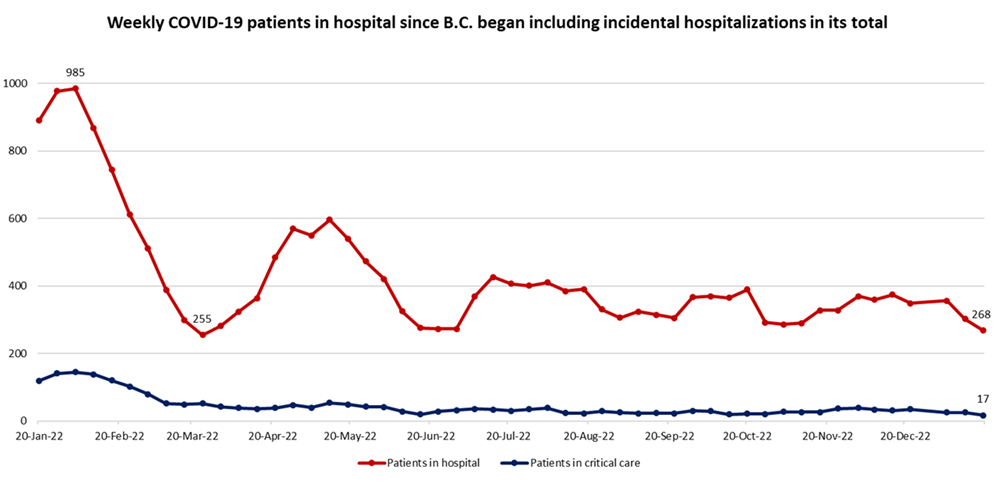COVID-19 cases in B.C. hospitals decline to lowest level in almost 11 months
 Courtesy: Shutterstock.
Courtesy: Shutterstock.
The number of patients in B.C. hospitals with COVID-19 has reached its lowest level in nearly 11 months, according to data released Thursday by the B.C. Centre for Disease Control.
There were 268 test-positive patients hospitalized in the province as of Thursday, the lowest number B.C. has seen on a Thursday since March 24, 2022, when there were 255 people in hospital with the coronavirus.
It's also the lowest weekly total the BCCDC has reported since it switched to weekly updates on COVID-19 data in early April of 2022.
 A trendline of the number of patients in B.C. hospitals with COVID-19 on Thursdays since the province switched to a "hospital census" model in January 2022 shows the highest, lowest and current numbers. (CTV)
A trendline of the number of patients in B.C. hospitals with COVID-19 on Thursdays since the province switched to a "hospital census" model in January 2022 shows the highest, lowest and current numbers. (CTV)
Since January 2022, the province has been including "incidental" hospitalizations in its COVID-19 data. That means the numbers in the graph show both patients who were seriously ill with COVID-19 and required medical care and patients who were admitted to the hospital for other reasons and tested positive for the disease once they got there.
Shortly after the switch to this "hospital census" model, the province hit its highest-ever Thursday total for hospitalizations, reaching 985 on Feb. 3, 2022. The 255 reported on March 24 was the lowest-ever total.
According to health officials, between 40 and 50 per cent of COVID-19 patients reported each week are in hospital because of the disease, while the rest tested positive incidentally after being hospitalized for other reasons.
HOSPITALS STILL STRUGGLING
The decline in COVID-19 patients in B.C. hospitals comes despite continued high levels of hospital use across the province, overall.
Health Minister Adrian Dix and provincial health officer Dr. Bonnie Henry have framed the challenges facing the health-care system as difficult, but not unexpected, saying hospitalizations always rise in January.
Still, the province reopened emergency operations centres at 20 hospitals earlier this month, and the facilities continue to operate above their typical capacity, excluding surge beds.
As of last Friday, there were 10,106 people hospitalized for all causes across the province. Including 2,500 surge beds, there are 11,680 total hospital beds in B.C. That means 87 per cent of all beds in the province were full at the end of last week, with hospitals operating at 110 per cent of their baseline capacity.
The strain of a difficult respiratory illness season coupled with the lingering effects of the pandemic led many health-care workers to contact CTV News to express frustration with provincial leadership, and to claim they fear retribution from their employers if they speak about their concerns publicly.
NO 'KRAKEN' SURGE YET
While the XBB.1.5 subvariant of the Omicron lineage of SARS-CoV-2 has caused surges in other parts of the world, the available data in B.C. has not yet shown a similar pattern.
Alongside the decline in the hospital census, this week's BCCDC data shows a lower number of cases detected through lab testing and declines in coronavirus concentrations in wastewater at some Lower Mainland plants.
Further, the plants where concentrations are still increasing have all seen the rate of increase slow down in recent weeks.
Last week, Henry made note of this trend as she and Dix provided an update on respiratory illness season.
The provincial health officer said B.C.'s whole-genome sequencing efforts had detected a total of 24 instances of the XBB.1.5 subvariant, dubbed the "Kraken" variant by some.
While there are certainly more than 24 cases of the variant in the province, it accounted for less than five per cent of the genomes sequenced in B.C. as of last week, according to Henry, who also sought to allay any fears people may have about XBB.1.5.
"Any new variant that has an advantage spreads more easily," she said. "That's what viruses do. They change to try and reproduce themselves more quickly. And if it spreads more easily, it often will replace the ones that went before it. So each new one that spreads, by definition, is the most infectious one to date."
"We must remember that these new strains may make us more vulnerable to infection, but they don't render us defenceless," Henry added, noting that B.C. has a high level of protection from vaccination and infection with other strains of Omicron.
Precautions like staying home when sick, wearing a mask in crowded spaces and places with poor ventilation, and – most importantly – keeping up with vaccinations, will help tame the Kraken variant, too, Henry said.
VACCINATION DATA
The provincial health officer described immunization with the Omicron-targeting bivalent vaccines as the most important protective measure people can take.
According to the BCCDC, 30,731 new COVID-19 vaccine doses were administered in the province during the week that ended Jan. 14.
The largest share of those are classified as either fourth (12,799) or fifth (9,276) doses on the BCCDC's COVID-19 dashboard, meaning they were administered to people who had already had at least one booster shot before the bivalent vaccines became available.
CTVNews.ca Top Stories

Settlement reached in complaint over Canada Post layoffs as strike hits four weeks
The union representing Canada Post workers says an unfair labour practice complaint over the company's layoffs has been resolved.
Rescue group saves 11-year-old girl floating alone in the Mediterranean for days after shipwreck
An 11-year-old girl from Sierra Leone was found floating in the Mediterranean Sea off Italy's southernmost island of Lampedusa, believed to be the only survivor of a shipwrecked migrant boat that had departed from the port of Sfax in Tunisia, a humanitarian group said Thursday.
Banks tell 2 Ontarians too much time has passed to cash decades-old cheque, GIC
Two Ontarians who recently found unclaimed money from decades-old investments were told by their banks there were no records of them in their systems.
Ontario Premier Doug Ford threatens to cut off energy to U.S. in response to Trump's tariffs
Ontario Premier Doug Ford has threatened to cut off energy supply to the U.S. in response to the tariffs President-elect Donald Trump plans to impose on all Canadian imports.
'We are in for more terrorism, not less,' warns Canadian terror expert amid Syria's political chaos
The collapse of Bashar al-Assad’s regime means the ticking time bomb of prisons holding thousands of suspected ISIS members in northeast Syria has become even more unstable, a Canadian terrorism expert warns.
Missing 'lost Canadians' deadline creates 'unknowable' number of new citizens: feds
The federal government is asking an Ontario Superior Court for more time to pass citizenship legislation for the "lost Canadians," saying that without an extension an "unknowable" number of people would automatically become citizens next week.
Elon Musk calls Justin Trudeau 'insufferable tool' in new social media post
Billionaire Elon Musk is calling Prime Minister Justin Trudeau 'an insufferable tool' in a new social media post on Wednesday. 'Won't be in power for much longer,' Musk also wrote about the prime minister on 'X.'
More than 60,000 customers without power in the Maritimes due to wet, windy storm
Tens of thousands of customers in the Maritimes woke up to no power Thursday morning and several schools are closed as a wet and windy storm makes its way through the region.
Air Canada to offer free Wi-Fi on flights for Aeroplan members, sponsored by Bell
Air Canada plans to offer free Wi-Fi to Aeroplan members aboard its flights starting next year, building on a partnership with telecom giant Bell that already gives passengers free text messaging capabilities.

































